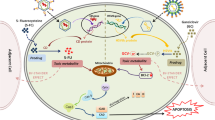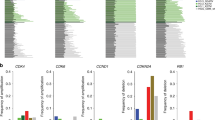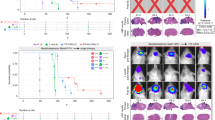Abstract
Adenovirus (Adv)-mediated herpes simplex virus thymidine kinase (adv/tk) gene therapy combined with ganciclovir (GCV) medication is a promising approach for the treatment of malignant glioma. However, optimal administration and the effect of possible adjuvant treatments have not been fully examined. In the present study, we examined the efficacy of adv/tk/GCV gene therapy in a syngeneic BT4C rat malignant glioma model, either as a single administration or given as three injections during three consecutive days. The effect of combined adv-mediated macrophage colony-stimulating factor (MCSF) and adv/tk gene transfer was also studied. BT4C malignant glioma cells were injected into the right corpus callosum of BDIX rats (n=112). Before gene therapy, the presence of tumors was verified by MRI. The rats were divided into eight groups as follows: group I (n=20) received a single adv/tk gene transfer (total dose 4×108 pfu) and GCV treatment for 14 days; group II (n=5) received the same gene transfer without GCV; group III (n=28) received three adv/tk injections (total dose 4×108 pfu) on three consecutive days and GCV for 14 days; group IV (n=5) received three similar adv/tk injections without GCV medication; group V (n=13) received three adv/MCSF injections (total dose 2×108 pfu) on three consecutive days and GCV medication; group VI (n=12) received three adv/tk and adv/MCSF (total dose 6×108 pfu) injections on three consecutive days followed by GCV medication; and group VII (n=12) the same treatment without GCV. Group VIII (n=17) consisted of wild-type BT4C malignant glioma tumors without any treatment. Treatment effect and tissue responses were characterized by general histology, immunohistochemistry, MRI, and survival of the study groups. The best treatment effect and survival was found in rats treated with adv/tk gene transfer once a day for three consecutive days (P<.05). No improvement of the treatment effect was seen after the combined adv/tk and adv/MCSF gene transfer compared with the repeated adv/tk gene transfer. The results show that 20% of the rats can be cured (survival >6 months) after optimized adv/tk gene therapy. It is concluded that repeated intratumoral administration of adv/tk is a promising approach for the treatment of malignant glioma tumors in vivo.
This is a preview of subscription content, access via your institution
Access options
Subscribe to this journal
Receive 12 print issues and online access
$259.00 per year
only $21.58 per issue
Buy this article
- Purchase on Springer Link
- Instant access to full article PDF
Prices may be subject to local taxes which are calculated during checkout




Similar content being viewed by others
References
Ammirati M, Galicich JH, Arbit E, Liao Y . Reoperation in the treatment of recurrent intracranial malignant gliomas Neurosurgery 1987 21: 607–614
Salcman M . Supratentorial gliomas: clinical features and surgical therapy In: Wilkins RH, Rengachry SS, eds Neurosurgery New York: McGraw-Hill, Health Professions Division 1996 777–788
Culver KW, Ram Z, Walbridge S, Ishii H, Oldfield EH, Blaese RM . In vivo gene transfer with retroviral vector producer cells for treatment of experimental brain tumours Science 1992 256: 1550–1552
Chen SH, Shine HD, Goodman JC, Grossman RG, Woo SLC . Gene therapy for brain tumours: regression of experimental gliomas by adenovirus-mediated gene transfer in vivo Proc Natl Acad Sci USA 1994 91: 3054–3057
Perez-Cruet MJ, Trask TW, Chen SH et al. Adenovirus-mediated gene therapy of experimental gliomas J Neurosci Res 1994 39: 506–511
Sandmair A-M, Turunen M, Tyynelä K et al. Herpes simplex virus thymidine kinase gene therapy in experimental glioma model: effect of the percentage of thymidine kinase positive glioma cells on the treatment effect, survival time and tissue reactions Cancer Gene Ther 2000 7: 413–421
Sandmair A-M, Loimas S, Puranen P et al. Thymidine kinase gene therapy for human malignant glioma, using replication-deficient retroviruses or adenoviruses Hum Gene Ther 2000 11: 2197–2205
Barth RF . Rat brain tumour models in experimental neuro-oncology: the 9L, C6, T9, F98, RG2 (D74), RT-2 and CNS-1 gliomas J Neuro-Oncol 1998 36: 91–102
Sandmair A-M, Loimas S, Poptani H et al. Low efficacy of gene therapy for rat BT4C malignant glioma using transduction with thymidine kinase retrovirus packaging cell injection with ganciclovir treatment Acta Neurochir 1999 141: 867–872
Ram Z, Culver KW, Oshiro EM et al. Therapy of malignant brain tumors by intratumoral implantation of retroviral vector-producing cells Nat Med 1997 3: 1354–1361
Barr E, Carroll J, Kalynych AM et al. Efficient catheter-mediated gene transfer into the heart using replication-defective adenovirus Gene Ther 1994 1: 51–58
Rajavashisth TB, Andalibi A, Territo MC et al. Induction of endothelial cell expression of granulocyte and macrophage colony-stimulating factors by modified low-density lipoproteins Nature 1990 344: 254–257
Puumalainen A-M, Vapalahti M, Agrawal R et al. β-Galactosidase gene transfer to human malignant glioma in vivo using replication-deficient retroviruses and adenoviruses Hum Gene Ther 1998 9: 1769–1774
Paxinos G, Watson C . The Rat Brain in Stereotactic Coordinates San Diego, CA: Academic Press 1986 (Plate 22)
Klatzmann D, Valéry CA, Bensimon G et al. A phase I/II study of herpes simplex virus type 1 thymidine kinase “Suicide” gene therapy for recurrent glioblastoma Hum Gene Ther 1998 9: 2595–2604
Rainov NG . A phase III clinical evaluation of herpes simplex virus type 1 thymidine kinase and ganciclovir gene therapy as an adjuvant to surgical resection and radiation in adults with previously untreated glioblastoma multiforme Hum Gene Ther 2000 11: 2389–2401
Trask TW, Trask RP, Aguilar-Cordova E et al. Phase I study of adenoviral delivery of the HSV-tk gene and ganciclovir administration in patients with recurrent malignant brain tumors Mol Ther 2000 1: 195–203
Acknowledgements
This study was supported by grants from Finnish Academy, Kuopio University Hospital (EVO Grants 5022 and 5118), Sigrid Juselius Foundation, Northern Savo Cancer Foundation, Finnish Society of Oncology, and Ark Therapeutics. The authors thank Aila Erkinheimo, Mervi Nieminen, Tommi Heikura, and Sirpa Laitinen for skillful technical assistance, and Marja Poikolainen for preparing the manuscript.
Author information
Authors and Affiliations
Rights and permissions
About this article
Cite this article
Tyynelä, K., Sandmair, AM., Turunen, M. et al. Adenovirus-mediated herpes simplex virus thymidine kinase gene therapy in BT4C rat glioma model. Cancer Gene Ther 9, 917–924 (2002). https://doi.org/10.1038/sj.cgt.7700515
Received:
Published:
Issue Date:
DOI: https://doi.org/10.1038/sj.cgt.7700515
Keywords
This article is cited by
-
Improved therapeutic effect on malignant glioma with adenoviral suicide gene therapy combined with temozolomide
Gene Therapy (2013)
-
Adenovirus-mediated expression of BmK CT suppresses growth and invasion of rat C6 glioma cells
Biotechnology Letters (2013)
-
Specific Inhibition of SRC Kinase Impairs Malignant Glioma Growth In Vitro and In Vivo
Molecular Therapy - Nucleic Acids (2012)
-
Increased invasion of malignant gliomas after 15-LO-1 and HSV-tk/ganciclovir combination gene therapy
Cancer Gene Therapy (2012)
-
Potential adenovirus-mediated gene therapy of glioma cancer
Biotechnology Letters (2010)



